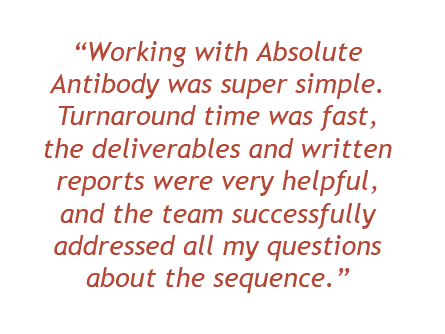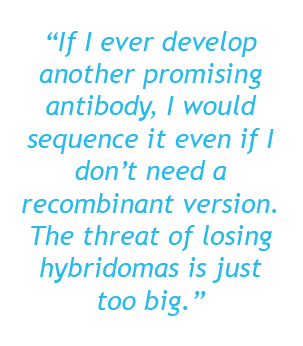Dr. Jake Kurtis of Brown University had to abandon a promising anti-malaria antibody after the hybridoma stopped expressing. Absolute Antibody was able to recover the antibody sequence, produce a high-performing recombinant version, and develop humanized variants.
Identifying Malaria Targets
Dr. Jake Kurtis, Professor of Pathology and Laboratory Medicine at Brown University, has spent nearly 25 years researching malaria, the mosquito-borne disease that kills one child every 60 seconds. His team travels to affected regions in sub-Saharan Africa to identify children with a natural resistance to malaria. Using differential whole proteome sequencing, the team then works to determine what antibodies resistant children make that susceptible children do not.
The Kurtis lab has identified potential vaccine candidates through these methods, with two set to be tested in Phase 1 clinical trials. However, the team faced a significant setback with one potential target. They had developed a monoclonal antibody to the target, able to very effectively kill malaria parasites in culture, but the hybridoma suddenly stopped secreting antibodies. Unable to resurrect it, they moved on to other potential targets, and about ten years passed with that hybridoma sitting in the lab’s freezer.
Rescuing the Lost Hybridoma
 In 2018, Dr. Kurtis came across information about hybridoma sequencing and realized it might allow him to return to that long-lost antibody. He researched companies offering hybridoma sequencing, and selected Absolute Antibody for its low prices and deep experience in the antibody field. Because the hybridoma had been unproductive for so long, Dr. Kurtis’ expectations were very low. Still, he figured it was worth the risk and sent us the hybridoma.
In 2018, Dr. Kurtis came across information about hybridoma sequencing and realized it might allow him to return to that long-lost antibody. He researched companies offering hybridoma sequencing, and selected Absolute Antibody for its low prices and deep experience in the antibody field. Because the hybridoma had been unproductive for so long, Dr. Kurtis’ expectations were very low. Still, he figured it was worth the risk and sent us the hybridoma.
Using high-throughput next-generation sequencing (NGS), we were able to determine the sequence for antibody transcripts within the hybridoma. We first extracted the mRNA of the hybridoma and then used random hexamer primers to generate a cDNA library, which was fragmented and sequenced by paired-end sequencing. Next, we assembled the sequencing reads into contigs, from which we identified antibody transcripts based on homology. The antibody sequence was returned to Dr. Kurtis within a month. “Working with Absolute Antibody was super simple,” Dr. Kurtis said. “Turnaround time was fast, the deliverables and written reports were very helpful, and the team successfully addressed all my questions about the sequence.”
 Assessing the Sequence
Assessing the Sequence
Dr. Kurtis had to confirm the delivered sequence could be used to produce recombinant antibodies with the same anti-malaria properties as the original hybridoma-derived antibodies. He therefore enlisted Absolute Antibody to produce five milligrams of recombinant antibody using our HEXpress™ mammalian transient expression system. He then tested the recombinant antibody using western blot, which showed it was indeed specific for the target protein, and growth assays, which showed the antibody still killed malaria parasites in culture while a negative control antibody did not.
Dr. Kurtis was very pleased with the results, and he is glad the antibody can never be lost again. “If I ever develop another promising antibody,” he said, “I would sequence it even if I don’t need a recombinant version. The threat of losing hybridomas is just too big.”
Moving to Antibody Humanization
The anti-malaria target had vaccine development potential, but Dr. Kurtis realized the antibody itself could be used as either a therapeutic or short-term immunoprophylactic. He therefore decided to humanize the antibody – and enlisted Absolute Antibody to take on the project.
Our humanization service guarantees to produce an engineered antibody with comparable activity to the parent clone, from a panel of at least 12 variants. The process also identifies variants with preferential manufacturing criteria, such as high expression and low aggregation. “The guarantee is the kind of thing that de-risks a project for an academic investigator, and really helped us make the commitment,” Dr. Kurtis said.
Throughout the process, Dr. Kurtis added, the Absolute Antibody team has provided recommendations for further modifying the antibody format to make it the strongest possible candidate. “We have had a great experience with Absolute Antibody,” he said. “They have the knowledge, expertise and consultative approach to help develop the best possible antibody.”
In April 2020, the Kurtis laboratory published a paper in Nature on the anti-malaria target, a protein called PfGARP. Absolute Antibody is cited in the methods section of the paper, available here.
You can download this feature as a PDF here.
Read more about Dr. Kurtis’ research on his laboratory webpage here.
Latest News
Upcoming Events
Please join us at the following conferences and events. Stop by our booth, or get in touch to arrange a meeting.
See All Dates
 United Kingdom (UK)
United Kingdom (UK)